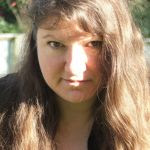
This is a guest post by Regina Ripley Patton. Ripley Patton lives mostly in her head but occasionally comes out to enjoy the scenery of the remote hills of the South Island that rise around her home. She writes speculative fiction because truth has always fascinated her more than fact. Her work has appeared in AlienSkin, Quantum Muse, The Lorelei Signal, Andromeda Spaceways Inflight Magazine, Flash Fiction Online, Reflection’s Edge, and the new Wily Writers website for Speculative Fiction Downloads. She currently has a science fiction story in the running for a Sir Julius Vogel Award for best short story. You can find a window into her mind and writing at http://rippatton.livejournal.com.
Reclaiming Gravity: The Birth of a New Zealand Writers’ Association
No one warned me I’d be weightless in New Zealand. It is one of those assumptions we make wherever we go. Gravity works. When I moved to the South Island in August of 2006, I expected particles of matter to attract one another just as they always had.
I am a writer particle, a speculative fiction particle, to be exact. Speculative fiction, for those unfamiliar, is the current umbrella term for the collective genres of science fiction, fantasy, horror, magic realism, paranormal, and all the blends of and in between. Basically it’s the writing of those who love to “wildly speculate”. That’s me.
In the Pacific Northwest of the US, where I come from, there were quite a few particles like me. These particles collected in masses through writers associations, workshops, frequent conventions, and other various joyful excuses to bump into one another. Because the particles were many, and close together, their pull on one another was fairly strong, producing a fine, heady gravity. I rarely felt as if I was going to just float off into space alone, never to be seen again.
And then I moved. Now, don’t get me wrong. I love my new country with its sheep, and inspiring scenery, and sheep. I was thrilled to be here, and one of the first things I did was sail off searching for like particles to bump into. Whee!
First, I looked up speculative fiction writers organizations. I found The New Zealand Sci-Fi and Fantasy Writers Association (NZSFW). Its website had not been touched since 2000 and a quick poke with a stick revealed it to be decidedly dead. I continued my search for weeks, shuffling through the lifeless and abandoned websites of New Zealand speculative writers who had died, moved to Australia, or simply floated off into the void, never to be heard from again. I began to grow lighter. I bought heavier shoes, weighted my pockets with stones, and avoided the open sky, but if was obvious to me that my weightlessness was growing worse by the day. Without other like particles to pull on me, it was only a matter of time before I became just another minuscule speck lost in the great blackness of space. Gravity had betrayed me.
One particularly light day, when my husband had tied my safety tether to the clothes line so I could hang the wash, I had a revelation. There had to be other particles like me out there somewhere, clinging desperately to their own small chunks of New Zealand. If I could just find them, shake them loose, encourage them that they weren’t alone, then collectively our gravity would increase. The more particles I could find, the more pull we’d have to attract even more particles. It didn’t matter if there were only a few to start. If we bumped against one another, and stuck it out, eventually gravity would be restored to us all.
And so began a search, a quest, if you will, to find speculative fiction writers in New Zealand who wanted to network, develop a writers organization, and not only gain some weight but possibly throw it around sometime in the future.
As of now, there is a core group of eleven such particles, including myself. We include a mix of genders, ages, genres and geographic locations. Among us is Lee Pletzers, the founder of Masters of Horror, myself, a Sir Julius Vogel Nominee, Grant Stone, an acceptee to the Australian Horror Writers Association 2009 mentorship program, Marie Hodgkinson, the editor of Semaphore e-zine, Anna Caro, a member of the 2010 Con committee, and the rest are just as talented and dedicated. This last weekend we decided on an official name (yet to be revealed) and will be moving forward in developing an organizational charter.
And if you’re interested, we’re still looking for core members. The more particles we get, the easier the load and the heavier the gravity. Our plans are to take our time, grow this thing well, and burst onto the scene in a Big Bang sometime in early 2010. Anyone keen to give up their weightlessness should contact Regina Ripley Patton at give(underscore)a(underscore)rip(at)yahoo(dot)co(dot)uk
Either way, if you are a writer of speculative fiction in New Zealand, we hope to support you through a quality writers association in the near future.
In the meantime, write with one hand, and hang on to something heavy with the other.
